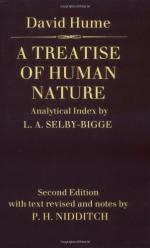
|
| Name: _________________________ | Period: ___________________ |
This test consists of 15 multiple choice questions and 5 short answer questions.
Multiple Choice Questions
1. Which of the following is a disposition involved with the passions?
(a) Sick emotion.
(b) Attendant emotion.
(c) Unattendant emotion.
(d) Deep emotion.
2. What does Hume say are the two types of reason?
(a) Demonstrative and probability.
(b) Respect and contempt.
(c) Love and hate.
(d) Envy and respect.
3. What is the title of Book Three, Part Three?
(a) Of Knowledge and Forgetting.
(b) Of Love and Hate.
(c) Of Sympathy.
(d) Of the Other Virtues and Vices.
4. Of what does vice give us the impression?
(a) Love.
(b) Pleasure.
(c) Pain.
(d) Hate.
5. According to what does Hume say we judge individuals ?
(a) Their internal being.
(b) Their judgements and morals.
(c) Their motives and actions.
(d) Their external appearance.
6. What is Hume's general goal in his treatise?
(a) To explain the origins of ideas and impressions.
(b) To explain the similarities between love and hate.
(c) To explain the origins of vice and virtue.
(d) To explain morality.
7. What does Hume say we need to stop men from fighting?
(a) Sport.
(b) Women.
(c) Children.
(d) Social units.
8. What was required to regulate society once it had evolved into a certain order?
(a) Justice.
(b) Religion.
(c) Morality.
(d) Passion.
9. Why does Hume reject all other moral theories?
(a) They cannot explain obligation.
(b) The cannot explain society.
(c) They cannot explain people.
(d) They cannot explain life.
10. What does Hume think a proper understanding of the will help us to understand?
(a) Love.
(b) Free will.
(c) The passions.
(d) Death.
11. To what does Hume say virtue is tied?
(a) Ability.
(b) Inability.
(c) Agreeableness.
(d) Disagreeableness.
12. Why do we love people we know more than strangers?
(a) They understand us.
(b) They resemble us.
(c) It is easier to talk to them.
(d) They don't judge us.
13. Which virtues does Hume say are culturally evolved?
(a) Vulgar virtues.
(b) Judgemental virtues.
(c) Natural virtues.
(d) Artificial virtues.
14. Into what two types does Hume divide direct passions?
(a) Those which respond to hate and those which respond to love.
(b) Those which are comfortable and those which are uncomfortable.
(c) Those which we understand and thosewhich we misunderstand.
(d) Those which respond to pain and those which are natural instincts.
15. How does Hume define respect?
(a) Listening to someone you don't like.
(b) Feelings of deep envy towards another person.
(c) Loving someone you want to be and perhaps could be.
(d) Feelings of love and humility towards another person.
Short Answer Questions
1. Which of the following is a quality that gives rise to moral sentiment?
2. Hume says religious people focus on what?
3. Which of the following does Hume suggest is the true origin of morals?
4. What passion does Hume say pity is like?
5. What kind of people does Hume say we admire?
|
This section contains 446 words (approx. 2 pages at 300 words per page) |

|




